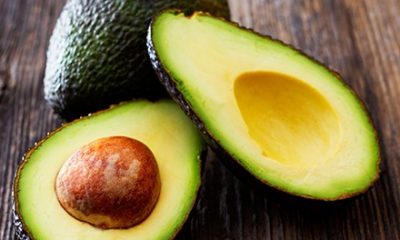Health
Health benefits of djeka leaves or ogyama leaves

Health
Side effects of garcinia cambogia

Discover the side effects of Garcinia cambogia.
Several studies have warned of the possible negative symptoms that a bad consumption of Garcinia cambogia could give us
The Garcinia cambogia is an original fruit of India and because of its high content of hydroxycitric acid (HCA), make it is a highly recommended food to lose weight quickly and naturally.
Despite this, poor consumption of this fruit could lead to undesirable side effects and setbacks.
It was in their home continent where they began to use this substance to help lose weight. Some fields consider it a “miracle fat burner” but we are sorry to say that there is no scientific study to support this idea.
The main slimming effects of Garcinia cambogia are caused by the hydroxycitric acid to which different satiating effects have been attributed that stimulates the metabolism and regulates the appetite, acting as a fat burner.
In this sense, experts assure that there are no results that scientifically confirm its effectiveness for losing weight, so it cannot be recommended as a fat burner.
Side effects of Garcinia cambogia
At the moment, there are no known side effects of Garcinia cambogia, however, they are still being evaluated. Several studies have warned of possible symptoms that a bad consumption of this fruit could give us:
▪ It could be inconvenient if taken with gastroenteritis, ulcer, or another stomach disease due to its high levels of citric acid.
▪ In the case of taking in high doses, slight gastrointestinal disorders could appear.
▪ Garcinia cambogia can lower blood sugar levels, so it is not recommended to take people with diabetes
▪ It contains iron, which can have a major impact on users with an iron-related disorder.
Problems in case of excess Garcinia
Excessive consumption of Garcinia cambogia could produce delirium, euphoria, and overexcitement, which will give us more insomnia; dry mouth, dizziness, diarrhea, and even a headache. Some people may experience irritability and decreased need for sleep.
According to various studies and investigations, it has been determined that excessive consumption of Garcinia cambogia can also cause health problems such as Elevated liver enzymes, jaundice, and liver damage.
These effects can cause a big health problem. For this reason, it is advisable to go to a professional before any sign of symptoms. In addition, it is recommended to go to a specialist before starting the consumption of Garcinia cambogia.
For this reason, we must be attentive and respect all the instructions that our nutritionist gives us because as we can see, there are many dangers of ingesting this type of food excessively.
Health
Benefits of cordyceps and side effects

Table of Contents
- Benefits of cordyceps
- Side effects of Cordyceps
- How to buy and take cordyceps:
- Related
- Discover the health benefits of cordyceps and side effects.
Cordyceps is highly used in traditional Chinese medicine.
- It is also used to treat inflammation and skin impurities and to enhance athletic performance and the immune system.
Recently, the adaptogenic mushroom has been a trend in the wellness and fitness community. Read on to find out how to use it for everyday wellness and the health benefits of cordyceps :
What is cordyceps?
There are over 400 species of cordyceps, but one of them is supreme for its medicinal properties.
Scientifically known as Ophiocordyceps sinensis, this type of cordyceps has gained the colloquial name “Caterpillar fungus” because it is a parasitic fungus normally collected from caterpillar larvae.
With its long, finger-like body and orange color, the wild mushroom looks like something you would see diving.
And while it can be collected and made into a supplemental powder or pill, most cordyceps we see in the pharmacy don’t come from the floor, they come from the laboratory.
Benefits of cordyceps
While more research is needed to conclusively prove the benefits of cordyceps, preliminary research on the mushroom has shown promise. Here are five of its most popular benefits.
1. Improves athletic performance:
The benefits of cordyceps are best known for their ability to increase the production of adenosine triphosphate (ATP), which our bodies use for energy.
It gives muscles more energy to use during exercise and therefore can improve performance during exercise.
A small study published in china on the many benefits of cordyceps suggests this is true.
The researchers divided the participants into two groups, those who received 3 grams of cordyceps per day and those who received a placebo.
After 60 days, while those taking the placebo saw no change, those taking cordyceps increased their VO2 max, a measure used to establish athletic endurance – by 7%.
And good news, if you enjoy pushing yourself during HIT or CrossFit, a study published in the Journal of Dietary Supplement also found that cordyceps can improve performance during high-intensity exercise.
2. Reduces signs of aging:
The fungi can not be a super modern addition to routine skin care or beauty, but because of its high content of antioxidants, the benefits of cordyceps are effective.
Antioxidants help protect our bodies from harmful compounds called free radicals, which accelerate the aging process.
The use of cordyceps increases your intake of antioxidants, which has been linked to anti-aging and improved hair, skin, and nail health.
3. Benefits of cordyceps for diabetes
It sounds strange, but one of the benefits of cordyceps is that it can help manage diabetes. Cordyceps is thought to mimic insulin, the hormone that manages blood sugar levels. Therefore, it can keep blood sugar levels within a healthy range.
In addition, by balancing blood sugar levels, cordyceps supplements can help reduce sugar cravings and therefore support healthy eating and weight loss.
4. Contains anti-inflammatory properties:
Inflammation is the immune system’s response to anything it interprets as irritating or harmful to the body.
While some inflammation is good, excess over long periods can lead to inflammatory diseases such as heart disease, Alzheimer’s, and diabetes.
The benefits of cordyceps, however, are thought to reduce inflammation. Cordyceps reduces the expression of inflammatory genes and pro-inflammatory cytokines such as TNF, IL8, and COX2. Less systemic inflammation and therefore reduced risk of chronic inflammatory diseases.
5. Helps in heart health:
In China, cordyceps is an approved treatment for cardiac arrhythmia, a condition marked by an irregular pattern of heartbeats.
Its anti-inflammatory properties are believed to be beneficial to people dealing with heart disease because heart disease is a chronic inflammatory infection.
Side effects of Cordyceps
The benefits of cordyceps are safe, but given its long history of use in traditional Chinese medicine, it is safe to assume that cordyceps is generally well tolerated by humans as long as it is from a high-quality source.
However, as it can interact with certain prescription drugs, it is best to consult your doctor before adding cordyceps to your routine.
This supplement is not recommended for pregnant women or people with autoimmune problems.
The most common side effect is digestive discomfort. Therefore, if you experience bloating, diarrhea, or abdominal cramps, stop taking it.
How to buy and take cordyceps:
Capsules and teas, you can find cordyceps in various forms. Most cordyceps supplements are not FDA approved. It is important to look at the label and ensure they have been third-party tested.
Powdered supplements can be blended into smoothies, coffee, cookies, and more. Generally, the recommended amount per serving is 1,000 to 3,000 milligrams per day.
We suggest taking it consistently for a few weeks before determining whether it’s working or not because adaptogens need to build up in the system before you notice an effect.
Health
15 Benefits of fenugreek and side effects

Table of Contents
- Introduction
- Nutrition facts of fenugreek
- Health benefits of fenugreek
- 1.- Benefits of fenugreek for digestion
- 2.- Benefits of fenugreek for cholesterol
- 3.- Rich in Iron Reserves
- 4.- Benefits of fenugreek for inflammation
- 5.- Eliminates inflammation in the outer body as well
- 6.- Benefits of fenugreek for testosterone
- 7.- Improves breast milk production
- 8.- It can be used as a natural flavoring
- 9.- Helps Eating Disorders
- 10.- Increase performance during exercise
- 11.- Treat type 1 diabetes
- 12.- Improves type 2 diabetes
- 13.- Benefits of fenugreek for weight loss
- 14.- Benefits of fenugreek for heartburn
- 15.- They are low in fat
- Discover the 15 shocking health benefits of fenugreek and side effects.
Fenugreek or Trigonella foenum graecum is an herb that has been used as a traditional remedy for at least a thousand years.
Traditionally, fenugreek is used in traditional Chinese medicine for dermatological diseases.
Meanwhile, the functionality of fenugreek has gone from being a traditional medicine to a common kitchen herb, or ingredients in soaps and shampoo in this modern age.
It is the seeds and powder that are used for cooking, particularly in Indian and Asian cuisine, and raw fenugreek spices are said to taste slightly sweet like maple syrup with a hint of nutty flavor.
This has made fenugreek one of the most perennial and multifunctional herbs ever.
In this article, we will learn more about fenugreek, including the health benefits of fenugreek for weight loss.
- Introduction
- Nutrition facts of fenugreek
- Health benefits of fenugreek
- 1.- Benefits of fenugreek for digestion
- 2.- Benefits of fenugreek for cholesterol
- 3.- Rich in Iron Reserves
- 4.- Benefits of fenugreek for inflammation
- 5.- Eliminates inflammation in the outer body as well
- 6.- Benefits of fenugreek for testosterone
- 7.- Improves breast milk production
- 8.- It can be used as a natural flavoring
- 9.- Helps Eating Disorders
- 10.- Increase performance during exercise
- 11.- Treat type 1 diabetes
- 12.- Improves type 2 diabetes
- 13.- Benefits of fenugreek for weight loss
- 14.- Benefits of fenugreek for heartburn
- 15.- They are low in fat
Introduction
• Fenugreek stands about 2-3 feet tall, with glossy green leaves, small white flowers, and pods that house the brown fenugreek seeds.
• In general, its appearance resembles that of clover.
• It is native to the regions of Mediterranean Europe, Western Asia, and the Middle East.
• Aside from being a kitchen ingredient, its flavor, which is similar to maple syrup with a slight peanut essence, is also used to hide the real taste of the medicine, which is often more unpleasant for the languages of the population in general.
• The aroma and flavor of the maple syrup itself come from the seeds. Interestingly, the same seeds taste bad when eaten raw, and they taste so much more when cooked.
• However, the seeds are still the most widely used part of the fenugreek plant. The leaves are also sometimes cooked, as seen in traditional Indian cuisine.
Nutrition facts of fenugreek
• Serving Size: 1 Scoop
• Calories – 35.5
• Carbohydrates – 6.4 g
• Protein – 2.5 g
• Fat – 0.7 g
• Fiber – 2.7 g
• Vitamins and minerals
• Iron – 3.7 mg (20% of DV)
• Manganese – 0.1 mg (7% of DV)
• Copper – 0.1 mg (6% of DV)
• Magnesium: 21 mg (5% of DV)
• Phosphorus – 32.6 mg (3% of DV)
• Vitamin B6 – 0.1 mg (3% of DV)
The Percent Daily Value (% DV) above is consistent with a 2,000 calorie diet. Daily Values may be different based on personal calorie needs.
Health benefits of fenugreek
Within fenugreek we can get the following list of benefits:
1.- Benefits of fenugreek for digestion
These are the first health benefits of fenugreek.
Digestive problems such as an upset stomach or constipation are part of our daily life. Fenugreek contains water-soluble fiber that works to relieve symptoms of constipation.
That way, digestion could go as usual and one can worry less about their weight.
2.- Benefits of fenugreek for cholesterol
Now here are the next health benefits of fenugreek.
Not just in terms of digestion, the health benefits of fenugreek also come in the form of improving cholesterol as well.
Fenugreek’s role in lowering cholesterol also applies to lower triglycerides as well.
An earlier study conducted in India revealed that a 2.5-gram dose of fenugreek, taken twice a day for three months, could lower cholesterol and triglycerides naturally without high-density lipoprotein (HDL) or cholesterol. positive affected.
3.- Rich in Iron Reserves
The nutritional facts above show that fenugreek has 3.7 grams of iron per 1 tablespoon, or the equivalent of 20% of the total daily value.
That is, of course, a staggering amount of iron intake. Iron is a mineral necessary to make red blood cells.
They also make up 70% of each hemoglobin or red blood cells within the body.
4.- Benefits of fenugreek for inflammation
When it comes to being an anti-inflammatory agent, fenugreek works inside the body first, precisely on the internal organs.
Fenugreek deals with inflammatory cases, such as oral ulcers, bronchitis, tuberculosis, cough, kidney disease, even cancer.
This makes fenugreek possible to prevent a wide range of mild to severe illnesses.
5.- Eliminates inflammation in the outer body as well
The other health benefit of fenugreek when it comes to inflammation is treating conditions caused by inflammation that take place on the skin, such as dandruff, acne, wounds, eczema, and gout.
However, before finally using fenugreek in the external treatment of inflammation, test it first on the area to be treated to ensure that no further infections occur.
6.- Benefits of fenugreek for testosterone
Fenugreek is especially helpful for men as it helps with development as well as repair of testosterone-related issues such as libido, erectile dysfunction, impotence, and others.
Speaking of sexual function, fenugreek also helps in the rapid increase in sexual arousal, sexual performance, desire, energy, and stamina.
7.- Improves breast milk production
It turns out that fenugreeks are not only beneficial for men but also women.
Fenugreek also improves breast milk production, especially for mothers who have low breast milk production.
It is possible because fenugreek itself is a galactagogue or substances that help increase milk production by stimulating the milk ducts and rapidly increasing production as short as one day.
8.- It can be used as a natural flavoring
This is a traditional function of fenugreek, which is for cooking and flavoring.
The use of fenugreek for spices or flavorings is most prominent in Indian cuisine, where it is used as an ingredient for curries.
Apart from that, fenugreek is also used to mask horrible flavors and medicines.
Fenugreek for flavor is of course much healthier and organic compared to say monosodium glutamate or monosodium glutamate.
9.- Helps Eating Disorders
Fenugreek helps with eating disorders by increasing appetite and improving nutrition.
According to the journal “Pharmacology Biochemistry and Behavior”, intensive consumption of fenugreek extracts dramatically increases the amount of food and motivation.
10.- Increase performance during exercise
Fenugreek can also be used to increase performance when exercising, especially when combined with creatine.
This is because this still increases creatine absorption without the maximized needs for simple carbohydrates.
11.- Treat type 1 diabetes
Fenugreek can be helpful for diabetic patients by improving the rate of sugar in the blood.
In one study, researchers included 50 grams of fenugreek in participants’ lunches and dinners over 10 days.
The result was a 54% improvement in 24-hour urinary blood sugar clearance along with reductions in low-density lipoprotein (LDL) cholesterol.
12.- Improves type 2 diabetes
The second proof that fenugreek helps diabetic patients cope with their disease is verified after conducting two simultaneous experiments using fenugreek and hot water, as well as fenugreek with yogurt.
However, this time the test is for patients with type 2 diabetes.
For eight weeks, participants who consumed a mixture of fenugreek and hot water showed positive progress compared to those who took fenugreek with yogurt.
13.- Benefits of fenugreek for weight loss
Fenugreek also helps control appetite, which could be helpful for anyone on a diet or looking to lose weight.
This was shown in a previous study that took 14 days, in which participants reduced their fat intake by 17% after using fenugreek to monitor their daily intake.
14.- Benefits of fenugreek for heartburn
Heartburn is a painful burning sensation that occurs within the chest or throat.
Heartburn is caused by acid from the stomach backing up into the esophagus.
A 2-week study among people who suffer from frequent heartburn found that fenugreek is an effective solution to treat their discomfort, in line with antacid medications.
15.- They are low in fat
These are the latest fenugreek health benefits.
The nutritional facts above indicate that fenugreek contains an extremely low amount of fat, with only 0.7 grams or 700 milligrams.
Low-fat values are important for reducing calorie intake, maintaining weight, and even preventing serious diseases like diabetes and cardiovascular disease.
-

 Food1 year ago
Food1 year ago10 + Benefits of carrot juice and side effects
-

 Health11 months ago
Health11 months ago50 Super Healthy (And Very Often Cheap) Foods
-

 Health1 year ago
Health1 year ago5 Shocking health benefits of kinkeliba and side effects
-

 Food1 year ago
Food1 year ago8 shocking benefits of leek juice and side effects
-

 Health1 year ago
Health1 year agoBenefits of guava leaves Sensually
-

 Weight Loss1 year ago
Weight Loss1 year agoChaz Bono weight loss secret
-

 Health1 year ago
Health1 year ago13 shocking health benefits of Thai eggplant
-

 Food11 months ago
Food11 months ago19 Benefits of tobacco plant and side effects












